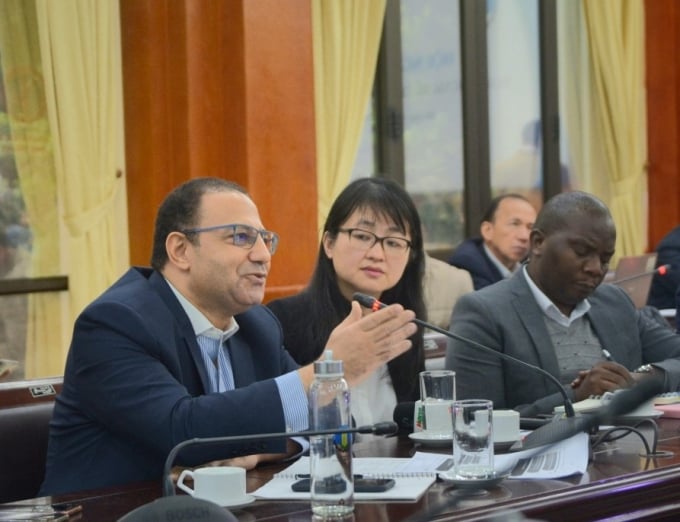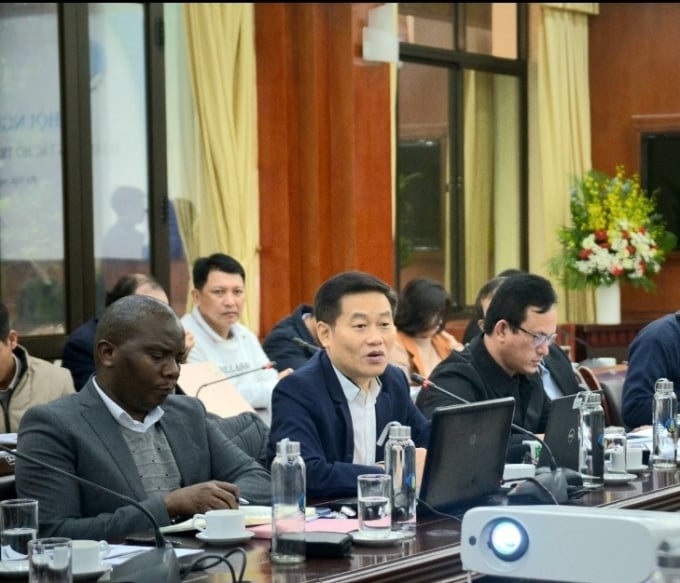November 24, 2025 | 06:01 GMT +7
November 24, 2025 | 06:01 GMT +7
Hotline: 0913.378.918
November 24, 2025 | 06:01 GMT +7
Hotline: 0913.378.918

Mr. Ahmed Eiweida. Photo: Le Tan.
Mr. Ahmed Eiweida, World Bank senior advisor affirmed: VnSAT is a very important project as it has a direct impact on hunger eradication, poverty reduction and economic development of Vietnam.
“We have achieved many targets and we must maintain those targets for the sustainable development of rice and coffee. However, we still face some difficulties which need to be solved by our cooperation so that the project will be completed on schedule.”
According to Mr. Ahmed, it is necessary to ensure the sustainability of projects and complete them in due time as World Bank and Vietnam have multiple complicated projects which are affected by weather condition.
A specific mechanism should be applied to ensure that the project is completed on schedule. When applying such mechanisms, it should be advised to categorize projects with relevant completion time into groups so that such projects could be completed on schedule.
“Ministry of Agriculture and Rural Development is the most important partner in World Bank portfolio. It is our pleasure to work with the Ministry. We emphasize that the success of VnSAT project is the very essential factor as well as the foundation for World Bank to consider some more projects with an aim to ensuring the sustainable competitiveness of Vietnam’s agricultural products," said Mr. Ahmed.
Mr. Cao Thang Binh, Project Manager of VnSAT project, World Bank representative affirmed:

Mr. Cao Thang Binh (in the middle). Photo: Le Tan.
The mission team which is responsible for supervising and supporting the 10th implementation of the project highly appreciated the achievements of the project so far: the number of people benefitting directly from the project is over 929,000 people compared with end December 2020 target of 800,000 people; cultivated area under the sustainable faming method is over 163,000 hectares compared with end December 2020 target of 150,000 hectares; net profit increase per hectare among farmers is 28.3% for rice against end December 2020 target of 30%, and 15.8% for coffee against end December 2020 target of 20%; GHG emission reduction from rice cultivation in the project area is over 1.3 million tons per year compared with end December 2020 target of 1 million tons per year; quality service improvement of MARD and DARDs has almost achieved end December 2020 target...
Many development indicators of VnSAT were achieved and even passed the set target. The credit component was excellently completed in the context of interest rates influenced by Covid-19.
“Rarely have that much success” with component A of VnSAT - Institutional Strengthening to Support Agricultural Transformation. Changing behaviors of farmers is really difficult due to their long - time existing farming practices. This success needs to be considered as valuable experience for other projects. It is necessary to coordinate efforts to successfully change behavior of farmers.
Author: Le Tan. Translated by Boi Thu.
/2025/11/22/4018-4-213342_747.jpg)
(VAN) The Mekong Delta Agricultural Experts Club has attracted 143 experts and researchers to participate in providing consultancy and contributing initiatives to the development of one million hectares of high-quality rice.

(VAN) Ca Mau’s development of OCOP products opens a path to increasing cooperatives value, helping boost income, expand markets, and affirm collective economy's role.

(VAN) Turning seemingly ordinary coconut shells into unique jewelry and artwork, Nguyen Bang Nhi spreads the value of local culture through her brand, Cocohand.

(VAN) Results from the Sustainable Durian Model Project in Dak Lak have confirmed the critical role of Yara Viet Nam in transferring advanced nutritional solutions to farmers.

(VAN) In Tuyen Quang province, livestock farmers have introduced effective models and innovative practices that significantly strengthen African Swine Fever prevention and control efforts.

(VAN) This is the study conducted by IRRI and Can Tho University on the rice straw value chain in Mekong Delta showing an economic potential of more than 6.6 trillion VND/year.

(VAN) By participating in cooperative economics, many farmers in Tay Ninh have overcome hardship, mastered clean dragon fruit cultivation techniques.